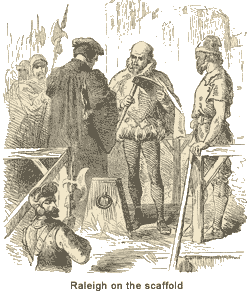Walter Raleigh* was born on his father’s leased estate at Hays Burton, England. He attended Oxford, volunteered for service with French Huguenots in 1569 and later studied law in London.
 In 1578, he joined forces with his half-brother Humphrey Gilbert to organize an exploratory venture in North America. However, the ships were prevented from sailing by a series of storms and eventually the expedition was cancelled. This failed effort was important to Raleigh because it had planted a seed within his mind - he was determined to establish English colonies in the New World.
Raleigh’s reputation was enhanced by service at Munster during the Irish rebellion (1580). That contribution, coupled with immense personal charm, led to a close friendship with Elizabeth I and knighthood in 1585. Raleigh further increased his standing by helping to expose a plot by Catholic elements to depose the queen in favor of Mary, Queen of Scots.
During the mid-1580s, Raleigh began efforts to establish permanent settlements in North America in an area he thoughtfully named Virginia, to honor his patroness the Virgin Queen. The culmination of these labors was the ill-fated Lost Colony on Roanoke Island.
With the looming threat of the Spanish Armada (1588), Raleigh played a leading role at court in planning for the island's defense. Records do not indicate that Raleigh participated in the fighting, however. With the crown nearly hamstrung by an empty treasury, Raleigh provided the government with a new warship, the Ark Royal, in exchange for an IOU.
Raleigh served briefly in Parliament in the 1590s, but his reputation was tarnished by his association with a group of poets known as the “school of night,” most of whom were widely known religious skeptics. An actual rupture with Elizabeth and imprisonment in the Tower of London occurred when the queen learned that Raleigh had secretly married one of her maids of honor, Elizabeth Throckmorton.
Following his release, Raleigh turned his attention to Guiana in South America, an area that he believed contained the fabled city of El Dorado. He explored portions of the Orinoco River and returned to England with only small amounts of gold.
Following the queen’s death in 1603, Raleigh’s enemies conspired against him and had him tried on charges of treason. Allegedly he had plotted against the accession of the new king, James I. A guilty verdict carried with it the death sentence, but James commuted the sentence to life imprisonment in the tower.
Raleigh spent his confinement writing poetry, history, and tales of his adventures. In 1616, he managed to arrange release from prison in exchange for his promise to provide a huge ransom. He was to gather the treasure in Guiana and solemnly pledged that in doing so he would not disturb Spanish installations in the area.
The venture turned out to be an unmitigated failure. No gold was found. The group decided to attack a Spanish fort and Raleigh’s son was killed. He returned home in disgrace.
In 1578, he joined forces with his half-brother Humphrey Gilbert to organize an exploratory venture in North America. However, the ships were prevented from sailing by a series of storms and eventually the expedition was cancelled. This failed effort was important to Raleigh because it had planted a seed within his mind - he was determined to establish English colonies in the New World.
Raleigh’s reputation was enhanced by service at Munster during the Irish rebellion (1580). That contribution, coupled with immense personal charm, led to a close friendship with Elizabeth I and knighthood in 1585. Raleigh further increased his standing by helping to expose a plot by Catholic elements to depose the queen in favor of Mary, Queen of Scots.
During the mid-1580s, Raleigh began efforts to establish permanent settlements in North America in an area he thoughtfully named Virginia, to honor his patroness the Virgin Queen. The culmination of these labors was the ill-fated Lost Colony on Roanoke Island.
With the looming threat of the Spanish Armada (1588), Raleigh played a leading role at court in planning for the island's defense. Records do not indicate that Raleigh participated in the fighting, however. With the crown nearly hamstrung by an empty treasury, Raleigh provided the government with a new warship, the Ark Royal, in exchange for an IOU.
Raleigh served briefly in Parliament in the 1590s, but his reputation was tarnished by his association with a group of poets known as the “school of night,” most of whom were widely known religious skeptics. An actual rupture with Elizabeth and imprisonment in the Tower of London occurred when the queen learned that Raleigh had secretly married one of her maids of honor, Elizabeth Throckmorton.
Following his release, Raleigh turned his attention to Guiana in South America, an area that he believed contained the fabled city of El Dorado. He explored portions of the Orinoco River and returned to England with only small amounts of gold.
Following the queen’s death in 1603, Raleigh’s enemies conspired against him and had him tried on charges of treason. Allegedly he had plotted against the accession of the new king, James I. A guilty verdict carried with it the death sentence, but James commuted the sentence to life imprisonment in the tower.
Raleigh spent his confinement writing poetry, history, and tales of his adventures. In 1616, he managed to arrange release from prison in exchange for his promise to provide a huge ransom. He was to gather the treasure in Guiana and solemnly pledged that in doing so he would not disturb Spanish installations in the area.
The venture turned out to be an unmitigated failure. No gold was found. The group decided to attack a Spanish fort and Raleigh’s son was killed. He returned home in disgrace.
 The Spanish ambassador protested Raleigh’s actions in Guiana and his earlier death sentence was reinstated. On October 29, 1618, he faced the executioner. As custom provided, he took the opportunity to examine the axe and is reported to have remarked, “This is a sharp medicine, but is a physician for all diseases.” His embalmed head was given to his wife, another customary practice, and she never let it out of her sight during the remaining 30 years of her life.
Sir Walter Raleigh was one of the most colorful figures of the Elizabethan Era and is important to American history because of his efforts to establish permanent settlements in Virginia.
The Spanish ambassador protested Raleigh’s actions in Guiana and his earlier death sentence was reinstated. On October 29, 1618, he faced the executioner. As custom provided, he took the opportunity to examine the axe and is reported to have remarked, “This is a sharp medicine, but is a physician for all diseases.” His embalmed head was given to his wife, another customary practice, and she never let it out of her sight during the remaining 30 years of her life.
Sir Walter Raleigh was one of the most colorful figures of the Elizabethan Era and is important to American history because of his efforts to establish permanent settlements in Virginia.